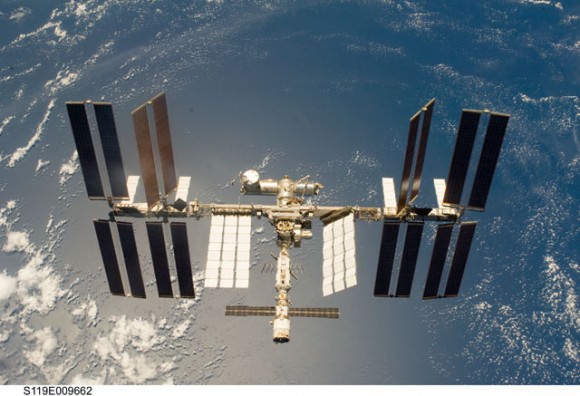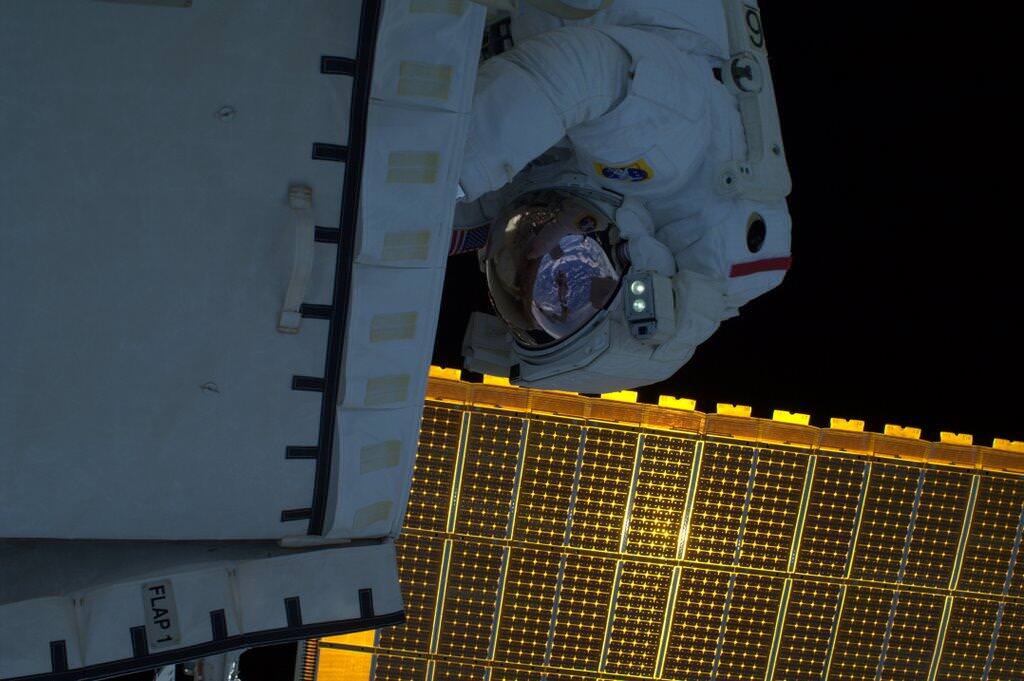NASA announced today that the Obama administration has approved NASA’s request for an extension of operations for the International Space Station for an additional four years to 2024. This means work on board the orbiting laboratory will continue at least for another decade.
“I think this is a tremendous announcement for us here in the space station world,” said Bill Gerstenmaier, associate administrator for NASA’s Human Exploration and Operations Mission Directorate, speaking during a press briefing today, “ and also for all of human spaceflight and for our international partnership.”
“This is a tremendous gift the administration has given us,” he added later.
Gerstenmaier said the extension allows NASA to expand their planning horizons, and it will change the way scientists and commercial companies look at their “investment” in the future of the ISS.
“We’re starting to see a lot of science benefits on ISS that have a lot of applications here on Earth, such as pharmaceuticals, materials processing, and climate change equipment, and operating until least 2024 opens up a large avenue of research on the ISS,” he said. “This also changes the perspective for commercial providers … as the commercial sector now has a larger market to carry cargo to space for NASA, as well as crew.”
Commercial Spaceflight Federation president and former astronaut Michael Lopez-Alegria agreed. “The International Space Station is the crown jewel of NASA’s human spaceflight program,” he said in a statement. “This extension comes at a critical time and paves the way for the ISS to fulfill its extensive and multifaceted potential – as a research lab that will provide countless benefits here on Earth, as an anchor destination for America’s commercial space race and as a jumping off point for deep space technology development and exploration.”
Gerstenmaier also sees the ISS as a proving ground for future human spaceflight plans to head out to deep space. “NASA doesn’t think of ISS and deep space human plans as separate, but as a combined strategy,” he said.
A recent review of ISS modules and equipment ensured that the station could likely last until 2028, and Gerstenmaier said this new extension allows operations to be at least considered until nearly 2030.
“Ten years from today is a far-reaching vision,” he said. “Our international partners are well aware of this extension and they were involved in hardware studies to see if station operations could extend. They will continue to evaluate their hardware and they all see this as a positive step in moving forward. … This is truly an international endeavor and we all work together.”

Gerstenmeier added that it’s not immediately clear whether all of the 15 nations involved in the ISS along with the US will continue to participate for the duration of the life of the ISS, but that NASA is prepared to work with whatever plans the international partnership evolves into over time.
He said that no additional funding for the ISS was currently required for the extension, as the basic budget now covers the ISS to at least 2020, and the funds set aside for eventually deorbiting the ISS will be shifted towards operations.
Additional funding will likely be required at some point, however, but well past when the current Administration and Congress will be obligated to decide.


What is the ISS really good for? Keeping humans in micro gravity, that is unnecessarily dangerous. Of all the health problems we have here on Earth, micro gravity is certainly not one of them!
Money could be better spent. No reason to use micro gravity for long term interplanetary travel either. Micro gravity experiments on materials and medicines could probably be done much cheaper robotically and with short term human visits in a small habitable module. I don’t see how ISS contributes to human spaceflight. It’s literally the lowest possible ambition and altitude for human space flight. We need to go interplanetary, and ISS doesn’t help with that, it’ll just keep us another 40 years in LEO. Getting some enthusiasts excited about how difficult it is for qualified astronauts to do basic outdoors repairs on this aging micro gravity half-habitable structure, as if that was something good. Way within 10 years it will decay and die like MIR did.
I don’t think the ISS is worth the $100+ billion it cost to construct it, but I don’t think it should be decommissioned anytime soon now that we have it. It costs a bit over $2 billion a year to keep it going although some of that cost also benefits other NASA programs so the accounting is not totally straightforward. That is almost the cost of one flagship planetary science mission per year.
It is good for international cooperation. Also the public is interested in seeing people in space. A lot of Universe Today readers are scientifically minded and would probably rather see a new flagship interplanetary mission each year instead of astronauts going round and round in Earth orbit, but NASA is a government agency in a democracy and they have to keep everyone happy.
The ISS is useful for testing out long term living in space. Testing toilets, air circulation and all the other mundane things necessary to keep a human alive in space can be studied relatively close to home. These aren’t exciting things, but they are necessary bits of knowledge that must be absolutely mastered. Allows for testing of in space construction and its tools and how various materials hold up to micrometeorites, radiation and extreme temperature changes over long periods of time.
ISS provides a good test bed for operating a large structure in space. A lot of planning and administration is required and is being refined by keeping a large space laboratory supplied, functioning and sometimes even repaired, year after year. This is all coordinated amongst many nations that are not always political friends.
ISS allows companies like Bigelow to test its modules in the near future. Provides expertise to commerical space companies to dock their new spacecraft or maybe test propulsion technologies. Extensive experience in space docking operations has been learned on the ISS since new crews and supply ships are constantly coming and going. This now seems pretty routine but isn’t wasn’t long ago.
I don’t think the ISS is very valuable though for some of the things it has been commonly advertised for like creating new medicines and microgravity manufacturing. Think it has provided some value for understanding effects of microgravity and psychological effects of living in small living area for a long time.
I think the ISS is more valuable for just learning the basics of extended periods living in space and the myriad complex and not-so-complex issues that must be well understood. Learning these things would probably result in catastrophe if attempted while on a first trip to Mars where there is no relatively easy escape back to Earth and where two-way communications take several minutes each way.
IMO, just as valuable as any science experiment was the international cooperation that brought the ISS into reality.
A Babylon 5!
A favorite saying: “He or she who goes there.. knows there!” I was hoping that at the end of the previously planned cycle(s), the ISS would be disassembled and sent to orbit the moon, re-assembled there…
Robots! do the dangerous then stock and otherwise re-supply the station. Then the Youmans arrive…. to OCCUPY the Moon!